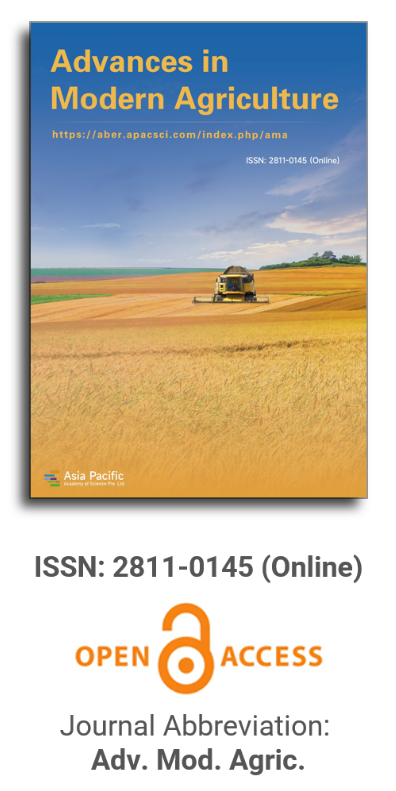


Advancing sustainable agriculture with beneficial microbes: Enhancing crop growth and yield for food security and human health
Vol 4, Issue 2, 2023
VIEWS - 4987 (Abstract)
Download PDF
Abstract
The application of biofertilizers (beneficial microbes) represents a transformative paradigm in modern agriculture. This paper delves into the multifaceted benefits of biofertilizers in the context of crop production. It examines how biofertilizers work their magic in enhancing crop growth, yield, and quality, underpinning their pivotal role in sustainable agriculture. Beyond these primary advantages, the paper explores the ripple effects of biofertilizer utilization, where it emerges as a linchpin in the global quest for food security. Biofertilizers not only reduce the environmental footprint of agriculture but also contribute to improving human health. This paper synthesizes current knowledge, revealing that biofertilizers have emerged as a potent tool in addressing the challenges of modern agriculture, from crop enhancement to environmental conservation and public health. It serves as a call to action for their wider adoption, heralding the era of biofertilizers as a cornerstone of sustainable agricultural practices.
Keywords
References
- Amanullah. Harvesting Success: A Comprehensive Guide to Agronomy Courses. Punjab Book Company; 2023. pp. 327–346.
- Amanullah. The role of beneficial microbes (bio-fertilizers) in increasing crop productivity and profitability. EC Agriculture 2015; 2(6): 504.
- Amanullah, Khalid S. Integrated use of phosphorus, animal manures and biofertilizers improve maize productivity under semiarid condition. In: Larramendy ML, Soloneski S (editors). Organic Fertilizers—From Basic Concepts to Applied Outcomes. InTech; 2016. pp: 137–155. doi: 10.5772/62388
- Amanullah, Khan A, and Khalid S, et al. Integrated management of phosphorus, organic sources, and beneficial microbes improve dry matter partitioning of maize. Communications in Soil Science and Plant Analysis 2019; 50(20): 2544–2569. doi: 10.1080/00103624.2019.1667378
- Bhattacharyya PN, Jha DK. Plant growth-promoting rhizobacteria (PGPR): Emergence in agriculture. World Journal of Microbiology and Biotechnology 2011; 28(4): 1327–1350. doi: 10.1007/s11274-011-0979-9
- Mucheru-Muna M, Mugendi D, Kung’u J, et al. Enhancing maize productivity and profitability using organic inputs and mineral fertilizer in a maize–soybean rotation in Meru South District, Kenya. Nutrient Cycling in Agroecosystems 2013; 95(3): 305–318.
- Rajendran G, Patel AK, Srivastava AK, Suresh A. Advances in technology and management of microbial inoculants for symbiotic nitrogen fixation in grain legumes. Agricultural Research 2012; 1(3): 215–230.
- Amanullah, Fahad S. Integrated nutrient management in corn production: Symbiosis for food security and grower’s income in arid and semiarid climates. Corn-Production and Human Health in Changing Climate 2018. doi: 10.5772/intechopen.80995
- Díaz-Rodríguez AM, Salcedo Gastelum LA, Félix Pablos CM, et al. The current and future role of microbial culture collections in food security worldwide. Frontiers in Sustainable Food Systems 2021; 4. doi: 10.3389/fsufs.2020.614739
- Abdel Aal AMK, Assiri ME, Al-Farga A, et al. Exploration of the
- benefits of biofertilizers for attaining food security in Egypt’s agriculture. Agronomy 2023; 13(10): 2477. doi: 10.3390/agronomy13102477
- Pathak DV, Kumar M. Microbial inoculants as biofertilizers and
- biopesticides. In: Singh D, Singh H, Prabha R (editors). Microbial Inoculants in Sustainable Agricultural Productivity. Springer; 2016; pp. 197–209.
- Cura JA, Franz D, Filosofía J, et al. Inoculation with Azospirillum sp. and Herbaspirillum sp. bacteria increases the tolerance of maize
- to drought stress. Microorganisms 2017; 5(3): 41. doi: 10.3390/microorganisms5030041
- Mushtaq Z, Faizan S, Hussain A. Role of microorganisms as biofertilizers. In: Hakeem KR, Dar GH, Mehmood MA, Bhat RA (editors). Microbiota and Biofertilizers. Springer; 2021.
- Gupta A, Gupta R, Singh RL. Microbes and environment. In: Singh R (editor). Principles and Applications of Environmental Biotechnology for a Sustainable Future. Springer; 2017.
- Shafi J, Tian H. Biofortification for sustainable crop production and human health. In: Biofortification of Food Crops. Springer; 2018. pp. 1–14.
- Alori ET, Babalola OO. Microbial inoculants for improving crop quality and human health in Africa. Frontiers in Microbiology 2018; 9. doi: 10.3389/fmicb.2018.02213
- Kong Z, Hart M, Liu H. Paving the way from the lab to the field: Using synthetic microbial consortia to produce high-quality crops. Frontiers in Plant Science 2018; 9. doi: 10.3389/fpls.2018.01467
- Alori ET, Fawole OB. Microbial inoculants-assisted phytoremediation for sustainable soil management. In: Phytoremediation: Management of Environmental Contaminants, Switzerland. Springer International Publishing; 2017.
- Amanullah, Ondrasek G, Al-Tawaha AR. Editorial: Integrated nutrients management: An approach for sustainable crop production and food security in changing climates. Frontiers in Plant Science 2023; 14. doi: 10.3389/fpls.2023.1288030
- Alori ET, Glick BR, Babalola OO. Microbial phosphorus solubilization and its potential for use in sustainable agriculture. Frontiers in Microbiology 2017; 8. doi: 10.3389/fmicb.2017.00971
- Mahanty T, Bhattacharjee S, Goswami M, et al. Biofertilizers: A potential approach for sustainable agriculture development. Environmental Science and Pollution Research 2016; 24(4): 3315–3335. doi: 10.1007/s11356-016-8104-0
- Nadia, Amanullah, Arif M, et al. Improvement in wheat productivity with integrated management of beneficial microbes along with organic and inorganic phosphorus sources. Agriculture 2023; 13(6): 1118. doi: 10.3390/agriculture13061118
- Khalid S, Amanullah, Ahmed I. Enhancing zinc biofortification of wheat through integration of zinc, compost, and zinc-solubilizing bacteria. Agriculture 2022; 12(7): 968. doi: 10.3390/agriculture12070968
- Amanullah, Khalid S, Muhammad A, et al. Integrated use of biofertlizers with organic and inorganic phosphorus sources improve dry matter partitioning and yield of hybrid maize. Communications in Soil Science and Plant Analysis 2021; 52(21): 2732–2747. doi: 10.1080/00103624.2021.1956520
- Al-Tawaha ARM, Karimirad R, Karimirad R, et al. Production of plant hormones from microorganisms. In: Sangeetha J, Al-Tawaha ARM, Thangadurai D (editors). Microbial Fertilizer Technology for Sustainable Crop Production. CRC Press; 2023.
Supporting Agencies
Copyright (c) 2023 Amanullah, Urooj Khan
License URL: https://creativecommons.org/licenses/by/4.0/

This site is licensed under a Creative Commons Attribution 4.0 International License (CC BY 4.0).

Prof. Zhengjun Qiu
Zhejiang University, China

Cheng Sun
Academician of World Academy of Productivity Science; Executive Chairman, World Confederation of Productivity Science China Chapter, China
Indexing & Archiving
In the realm of modern agriculture, the integration of cutting-edge technologies is revolutionizing the way we approach sustainable farming practices. A recent study published in Advances in Modern Agriculture titled "Classification of cotton water stress using convolutional neural networks and UAV-based RGB imagery" has garnered significant attention for its innovative approach to precision irrigation management. Conducted by researchers from Institute of Data Science and the AgriLife Research and Extension Center of Texas A&M University (authors's information is below). This study introduces a novel method for classifying cotton water stress using unmanned aerial vehicles (UAVs) and convolutional neural networks (CNNs), offering a powerful solution for optimizing water use in agriculture.
Modern agricultural technology is evolving rapidly, with scientists collaborating with leading agricultural enterprises to develop intelligent management practices. These practices utilize advanced systems that provide tailored fertilization and treatment options for large-scale land management.
This journal values human initiative and intelligence, and the employment of AI technologies to write papers that replace the human mind is expressly prohibited. When there is a suspicious submission that uses AI tools to quickly piece together and generate research results, the editorial board of the journal will reject the article, and all journals under the publisher's umbrella will prohibit all authors from submitting their articles.
Readers and authors are asked to exercise caution and strictly adhere to the journal's policy regarding the usage of Artificial Intelligence Generated Content (AIGC) tools.
Asia Pacific Academy of Science Pte. Ltd. (APACSCI) specializes in international journal publishing. APACSCI adopts the open access publishing model and provides an important communication bridge for academic groups whose interest fields include engineering, technology, medicine, computer, mathematics, agriculture and forestry, and environment.



.jpg)
.jpg)

.jpg)
